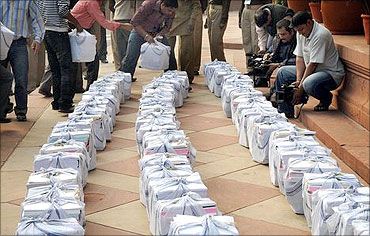 Sudhakar Ramasubramanian (pictured below), managing director, Aditya Birla Money, says expectations from the Union Budget are high, as the government has pushed the bar by promising big-ticket announcements.
Sudhakar Ramasubramanian (pictured below), managing director, Aditya Birla Money, says expectations from the Union Budget are high, as the government has pushed the bar by promising big-ticket announcements.
He talks to Business Standard on this, liquidity concerns in the market and how domestic participants could play a bigger role.
Edited excerpts:
What expectation do you have from this Budget?
High because they have had a good seven-eight months of a golden run.
Their priorities are in the right place.
Hence, we do expect to see some big changes which will help business and infrastructure, and which will help individuals in some way.
We are expecting good announcements.
The government has made it clear that there will be big changes.
So, the expectations of the market are high.
The markets have been volatile and this has kept retail investors away. At what point should investors enter the market?
The markets have had a very steady, almost one-way run from September 2013.
There have been very few corrections in between but significant inflow by both foreign and domestic investors.
So, lots of profit-taking opportunities exist and some reorientation in some stocks will happen.
We have been calling this a bull market since September 2013 and would see such uncertainties in any bull run.
I consider these uncertainties as opportunities for people who have not yet participated.
Considering the uncertainty globally because of what is happening in Europe, the fall in crude oil prices and concerns about global growth, will Indian markets continue to get the kind of inflows we have seen in the past few years?
If you look at the fundamentals for India, there are a lot of positives like inflation coming down and the decline in crude oil prices, among other things.
Budget 2015: Complete Coverage
If we look at the macro economic situation, I don’t think we can ask for anything better.
The positives are on the fundamentals but the negative in the short run could be the liquidity.
Over the next couple of years, investments from some of the oil-producing countries would come down because the drop in prices poses a liquidity issue for them.
Foreign Institutional Investor participation has also come down last year ($16 billion in 2014 against $19 bn in 2013), despite the fact that the markets have moved up.
This is because the decrease in FII flows is getting compensated by domestic institution participation.
We will continue to see more of domestic flows. The confidence on the Indian capital markets is improving.
It is still early days and we have not seen enough retail participation yet.
 Now that the interest rate cycle has turned, by how much do you see rates coming down?
Now that the interest rate cycle has turned, by how much do you see rates coming down?
Interest rates are likely to move down in the coming months, supported by two factors. One, the easy money or soft policy from the Reserve Bank.
Two, due to macro economic facilitators like lower inflationary pressures and lower inflationary expectations of households.
The official or repo rate might come down by another 50 basis points before June 2015 and another 25 bps before the end of 2015.
It is equally important that the market rates or yields also come down, along with the official rate or the repo rate.
What is your view on the currency, with the possibility of a US interest rate rise looming large?
I don’t see big depreciation in the currency because the differential between our interest rates and those in the US is coming down.
Our rates have dropped and the chances of the US raising rates in the current global scenario are growing weaker.
Central banks are not worried about growth; they are worried about whether inflation expectations will be met.
Even for the US Fed, that is the situation.
Could there be a reversal in flows if the US Federal Reserve raises interest rates later in the year, even though the European Central Bank has started a quantitative easing programme?
The programme is yet to become fully operational and once it becomes full-fledged, some liquidity might find its way into emerging markets like India.
However, it might not be correct to say we might see a lot of outflows due to the US Fed raising the rates.
Those allocations which are predominantly India-centric will continue to stay invested.
In any case, the rise in rates in the US is expected only in the second half of this year, most probably towards the year-end.
The Fed has time and again indicated it would like to be patient with rate increases.
Despite any that could come up towards year-end, the Indian assets would still offer a differential return, which would enthuse foreign investors to stay invested.
Image (Top): This file photograph shows Budget papers being brought to the Parliament. Photograph: Kind courtesy, PIB











